- Home
- Margaret Mahy
Kaitangata Twitch
Kaitangata Twitch Read online
This edition first published in 2010
First published in 2005
Copyright © Margaret Mahy 2005
All rights reserved. No part of this book may be reproduced or transmitted in any form or by any means, electronic or mechanical, including photocopying, recording or by any information storage and retrieval system, without prior permission in writing from the publisher. The Australian Copyright Act 1968 (the Act) allows a maximum of one chapter or ten per cent of this book, whichever is the greater, to be photocopied by any educational institution for its educational purposes provided that the educational institution (or body that administers it) has given a remuneration notice to Copyright Agency Limited (CAL) under the Act.
Allen & Unwin
83 Alexander Street
Crows Nest NSW 2065
Australia
Phone: (61 2) 8425 0100
Fax: (61 2) 9906 2218
Email: [email protected]
Web: www.allenandunwin.com
Cataloguing-in-Publication details are available from the
National Library of Australia
eISBN 978 174343 624 0
‘Cannibal Isle’ lyrics from a recording by George Formby; author not traced
Cover designed by Bruno Herfst
Cover images: Getty Images Library (background), Helen Mitchell (face)
Inside cover images: Helen Mitchell, Michael Draper, Wiki Kessell,
Barry Sligh and Production Shed.TV
Text designed by Ellie Exarchos
Set in 11.7/17 pt Adobe Garamond by Midland Typesetters
MARGARET MAHY’s stories for children and teenagers are known and loved around the world. She is the author of 200 books ranging from funny and rumbustious to spooky and mysterious, and has twice won the Carnegie Medal, the UK award for best children’s book. Margaret lives in Governor’s Bay, New Zealand.
CONTENTS
PART ONE
1
2
3
4
5
6
7
8
PART TWO
9
10
11
12
13
14
15
PART THREE
16
17
18
19
20
21
22
23
1
Flick! There it was again.
‘Need!’ whispered the voice. ‘Need! Need!’
Down on the beach, hauling the blue canoe from the family boathouse, Meredith listened, though it was not like ordinary listening. The words seemed to be welling up from deep inside her own head. She paused, frowning. Had she really heard those words or was it something she was making up? ‘Need!’ urged the voice again. ‘Danger! Danger!’ it said . . . it almost sang, but in a muffled and struggling way, as if the song were coming out of a mouth filled with moss. Then the voice chanted an answer to some question she had not asked. ‘Need! Feed! Need! Feed!’
Meredith stood, waiting and listening, but whatever it was had said all there was to say. So she bent once more and pushed the canoe out into the sly ripples that were licking the edge of the drowsy, late-spring land. What am I doing here? she asked herself as she began paddling, though it was a strange question, because she was doing what she often did on early Sunday mornings . . . what she had been planning to do as she went to bed the night before. But is it morning? Why don’t I remember waking up? Or getting dressed? Or anything?
The donkeys lined up along the fence above the zigzag track, and began braying, asking a question, and then immediately answering it themselves. (Hee? Haw! Hee? Haw!) Smooth ripples curved away from the prow of the canoe, and the canoe, perhaps listening to the donkeys’ question, seemed to be writing an answer of its own, an answer which vanished into the sea before it could be properly read. Meredith paddled on.
At last the canoe ran softly and grittily onto Shelly Beach, one of the seven little beaches that circled the island of Kaitangata. These beaches were separated from each other by fingers of rock, all pointing at different angles out to sea. Though the rounded western end of the island was blanketed by early-morning fog, the sharp eastern end was bright with light from an early morning sun . . . or was it afternoon? What time of day was it? The strange light seemed to be seeping up out of the land rather than falling on it from above. Meredith blinked and thought she must look for the sun properly – but in a minute.
Hee? Haw! Hee? Haw! The donkey voices were asking and answering.
Meredith headed towards the eastern end of the island, crossing one little beach then scrambling across rocks to the next one. She knew them all well, the four beaches on the south side and three on the north, and walked confidently over sand and thick drifts of broken shells, past sticks, sodden pine cones, plastic bottles and beercans tossed out of boats by weekend sailors, the skeleton of a fish pecked almost clean by gulls, a glove made of yellow rubber. Meredith was always surprised just how many rubber gloves washed up at the head of the bay. Shredded plastic bags punctuated the clumps of seaweed with harsh commas of blue and scarlet, and a black sandal made an exclamation mark at the end of whatever sentence the tide had written on the sand.
At last Meredith reached the eastern end of the island, picked her way around the familiar rocks, and found herself looking along the northern coast – three beaches and then the mist again. Hee? Haw! Hee? Haw! cried the donkey voices, which was strange, for she could not remember ever hearing them from this side of the island before.
Hadn’t it had been something like sunlight a minute ago? So why did it suddenly seem so late? And not just late but strangely late, thought Meredith, frowning. The sky was clear and intensely blue, but there suddenly seemed to be something threatening about the curious deepness of that blue. Then she saw that since she’d been there last, someone had put up signs and named the beaches. HAND BEACH said the nearest sign – white printing on blue, exactly like the street signs in the new Trident Cove development. A Sebastian Cardwell sign! thought Meredith. Sebastian Cardwell. For years that name had suggested power and money, and yesterday he had been elected to the local council. Now it seemed he was out on Kaitangata too, labelling and dividing up her private world. Looking ahead to the second beach, she thought she could make out another sign beyond the next pointing finger of rock, while even further away, where the third beach began . . . but then Meredith forgot the signs.
Far ahead of her, in the distant mist stood a crowd of waiting people, dark and faceless. One figure stood in front of the others, poised as if patiently waiting to give a speech or offer a gift. Though Meredith could not be sure, she had the strangest feeling that it might be holding a bunch of flowers . . . the sort of flowers that brides carry, or that little children present to the wives of visiting prime ministers.
Who were they, those dim, waiting people? Who could possibly be standing there in this odd, brassy light on the empty island of Kaitangata? Meredith stepped off the rock and onto the sand. Immediately, something seized her ankle. Looking down, she saw the fingers of a pink rubber glove gripping her leg. She tried to kick it away, but the raw pink fingers tightened horribly, and then – then the whole beach flexed itself in front of her. It was as if that seemingly empty glove was really a hand, powered by a secret muscle running the whole length of the beach.
She screamed. Sand seemed to fall away around her, as if the island were opening a mouth. (Flick! ‘Feed!’ demanded that voice.) ‘Help me! Help me!’ she called, waving at the distant figures, but none of them stirred. Now she was chest-deep, then chin-deep, in sand, sticks and shells, struggling, writhing, as she felt other h
ands tightening on her, tugging her down, down and further down. One of her arms, somehow angled over her head, flapped in the air like a disjointed wing, while the other was jammed to her side by the heavy, wet sand. Struggle as she might, she was being drawn into the very stuff of the island.
She opened her mouth to scream again but wet sand forced its way up her nose and over her head, throttling her there, under the surface of Kaitangata. She was about to become part of the island for ever. And then . . .
And then Meredith woke up.
She was not on the island. She was not in her bed, either. She was kneeling on the window seat in the familiar, family sitting room, wearing her pyjamas, but with her new birthday binoculars dangling around her neck. Through the window in front of her she could see an old moon outlining Kaitangata in silver.
As she tried to empty the last of the nightmare out of her head, the whole world shuddered. This was not a dream-shivering. The ornaments on the mantelpiece behind her set up a frantic staccato rattling, the tongs and poker hanging by the fireside clanged against each other. Meredith saw the moonlit floor twisting as if two lines of ripples, running under the floor rugs, were coming at her from two directions at once and colliding under the window seat, which bucked as if it were trying to get rid of her. Two family photographs toppled softly forward into the fireplace. Then the ornaments stopped their frantic dancing. The world relaxed and grew still once more.
Meredith buried her face in the cushions, allowing alternating ripples of panic and relief to wash over her. The relief grew stronger and stronger, driving the panic away. A bad dream – but only a dream. An earthquake – but only a little one. She stood, picked up the fallen photographs and placed them tenderly back on the shelf above the fireplace, then wound her way upstairs to bed. In the end, after making a small bed-earthquake of her own, tossing and turning, she did sleep . . . she must have slept . . . because she woke up in an ordinary way, without any further dreams – no dreams she was able to remember, anyhow. Even if she had remembered them, her father’s voice might have hunted them out of her head and into the dissolving light of day.
2
‘Of course he will ruin it. He’ll ruin the whole bay!’ Mr Gallagher cried, pacing from sitting room to kitchen and back again. ‘They say he’s got quite a mansion just out of Sydney. Why doesn’t he run his wretched empire from Australia and leave us alone?’
Meredith, who was on her way downstairs, saw her wild, tall, craggy father come stalking out of the kitchen, only to stand, hesitating, as if he wanted to go in every direction at once.
‘I mean, look what he’s already done to Old Creek,’ he ordered the sitting room, and Meredith decided to do exactly as her father said, even if he was really talking to himself. The binoculars were on the little table beside the couch, and, picking them up, Meredith stared across the bay towards the inlet that had once been called Old Creek. She could make out gingery scars of raw, volcanic soil scraped free of bush and grass and the distant glint of new surfaces – new glass, new tin, new paint – seeming to dissolve out of nothing.
‘Of course we have to call it Trident Cove these days, don’t we?’ her father was exclaiming. ‘And what about that great wall they’re putting up along the roadside? Do they think that the people who are moving in there need to be protected from the rest of us? Well, take it from me, they’re the pollution, not us.’
Meredith swept the binoculars around Old Creek then past it to Kaitangata, focusing on the very top, where grey knuckles of rock broke through the soil and grass. Hundreds of years ago the island had clenched an inner fist and punched up towards the sky. One day, if she was secret and sly enough, she might actually see ancient grey fingers unfold and . . . and snatch at seagulls, perhaps, or make some rude, mocking sign at the new houses of Old Creek which she must now call Trident Cove.
‘Dad—’ she began, but her father was in a lecturing mood, not a listening one.
‘Sebastian Cardwell!’ he exclaimed again, somehow making the name sound like a whole argument, nodding his head and utterly agreeing with himself as he spoke. ‘Why has he come back to torment us? He won’t be happy, you know – he just won’t be happy – until he’s turned the whole bay into a city suburb. And then he’ll be able to move out and live in some unruined place across the Tasman because he’ll have all the profit from ruining ours!’
As he began pacing the room again, Pudding, the big dog, half-labrador, half-poodle, sat up hopefully, thinking a walk might be in the offing. She was a simple dog and easily fooled. The other dog, Pie, smaller but cleverer, cocked his ears, but did not bother to lift his head from his paws. He simply lay there looking rather like the head of a ginger mop.
‘Now he’s on the council there’ll be no stopping him,’ said Mr Gallagher, suddenly slumping into the old green chair, which creaked and sagged a little to the left.
‘Dad, you’ve said that ten times already.’
‘Someone’s got to say it, and keep saying it. We can’t all have the fun of being dreamers like you.’ He sat up. ‘Have you done your music practice?’ he asked.
At that moment Rufus, Meredith’s younger brother, burst in through the door from the verandah, all ears and enthusiasm, followed by their mother and his good friend Allan Ponty. Mrs Gallagher walked up behind her husband’s chair, pushed red curls away from the bald spot at the back of his head and planted a smacking kiss in the middle of it. Mr Gallagher was not comforted.
‘Don’t you care?’ he cried, ducking sideways, and hastily stroking the hair back over his bald spot.
‘Of course I do,’ said Mrs Gallagher, just a little wearily. ‘But I can’t think of anything new to say. Because – face up to it – Sebastian’s been elected. That’s democratic process at work isn’t it, and we’re all supposed to approve of democracy.’
‘But he’ll ruin the place!’ cried Mr Gallagher.
‘Dear, it’s his land,’ Mrs Gallagher said with a sigh. ‘He’s a Cardwell and a Wittwood too. Right? And those families were battling the gorse and the long dry summers for years before we moved out here.’
‘Cardwells probably planted that gorse,’ Mr Gallagher said. If he had been a cat, Meredith thought, he would have been flattening his ears against his skull.
‘It’s just a pity from our point of view that Sebastian’s such a natural exploiter,’ said Mrs Gallagher. ‘But why should he care about the Bay in the way that we do? I don’t think he enjoyed living here when he was a kid, and by now he’ll be a real city man. A lot of people are impressed with his international wheeler-dealer image.’
‘Dad says Mr Cardwell’s got a good sense of humour,’ said Allan Ponty shyly.
‘Oh, Sebastian can laugh all right!’ said Mr Gallagher. ‘Laugh all the way to the bank.’
‘He didn’t laugh much when he was at school,’ said Mrs Gallagher. ‘Remember?’ (She was raising her voice a little.) ‘You other boys were rough on him at times. Anyhow, all the land on this side of the bay is still designated “agricultural”. So don’t tear yourself to bits over things until you need to, darling! It may never happen.’ She did not sound particularly hopeful, Meredith noticed.
Mr Gallagher was not pacified.
‘Now he’s on the council he’ll have access to that new District Scheme they keep promising. He’ll get them to reclassify everything he owns as “residential”. And then he’ll subdivide! Great heavens, McDonald’s will probably move in.’
‘McDonald’s!’ Rufus was excited for the first time. ‘Good one! But not right here!’ he added quickly, catching his father’s rolling eye. ‘Not next to us! At the head of the bay, beside the pub! Or over by Old Creek, I mean Trident Cove,’ he added slyly. He often tried to keep family arguments going, just for the excitement of it all.
Out in the kitchen someone opened the fridge door. Dogs and boys turned in the direction of the sound.
‘Did you feel the earthquake last night?’ yelled Kate. Meredith could hear her rustling and rattling
, scavenging for food.
‘Earthquake?’ exclaimed Rufus. ‘What? That old Kaitangata twitch?’
‘Yeah! Woke me up,’ said Allan importantly.
‘Kate, don’t empty the fridge,’ Mrs Gallagher called quickly. ‘It’s going to be lunchtime soon.’
‘Plee-eeease!’ wailed Kate. ‘I’m starving.’
‘I missed an earthquake,’ Rufus cried. ‘Did you feel it, Merry?’
‘I felt something, but by this morning I thought I must’ve dreamed it,’ Meredith answered vaguely.
‘Typical!’ said Rufus scornfully. ‘She dreams all the time. She used to walk in her sleep,’ he told Allan, looking at Meredith with a mixture of pride and envy.
‘It wasn’t a big earthquake,’ said Allan in a comforting voice. ‘Just the same old twitch.’ And he rocked his right hand backwards and forwards, illustrating the earthquake’s movement.
‘A sign of doom,’ cried Rufus, making his voice echo from the back of his mouth. Then he clutched his throat and staggered around the room ‘Urrrrgh!’
‘More likely a sign of Sebastian Cardwell being elected to the council,’ Kate called from the kitchen in a muffled voice. She was enjoying a private, pre-lunchtime feast in there, even though she had been told not to eat anything. Rufus nudged Allan, and, when Mrs Gallagher wasn’t looking, the two boys edged out to scavenge for themselves.
‘Dad, why do we call earthquakes Kaitangata twitches?’ asked Meredith.
‘Local joke!’ said her father, as, out in the kitchen, the fridge door opened for a second time.
Kate wandered in, eating a cold sausage. She was sixteen, a grown-up really, with her mother’s fair hair and dark eyes. But whereas Mrs Gallagher’s hair was scraped back into an untidy ponytail, Kate’s floated around her in a cloud of pale gold. As she walked through a patch of sunlight, this floating hair became a glittering net, turning her into an illustration from a book of fairy tales, or a science-fiction diagram of an electronic field.
‘Dad,’ Kate said. ‘Sebastian Cardwell doesn’t own the whole bay. If he really tries to ruin things for us, couldn’t the rest of us gang up on him, and make him back off?’

 Shock Forest and other magical stories
Shock Forest and other magical stories The Riddle of the Frozen Phantom
The Riddle of the Frozen Phantom Aliens In The Family
Aliens In The Family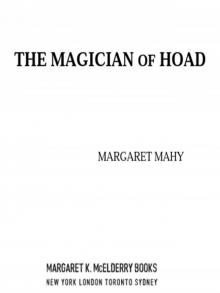 The Magician of Hoad
The Magician of Hoad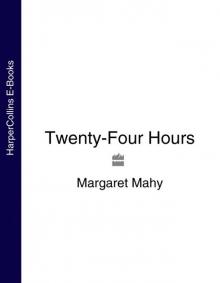 Twenty-Four Hours
Twenty-Four Hours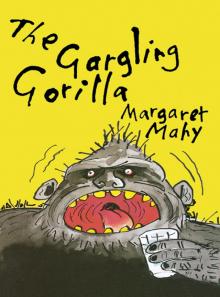 The Gargling Gorilla
The Gargling Gorilla Kaitangata Twitch
Kaitangata Twitch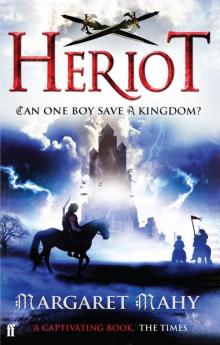 Heriot
Heriot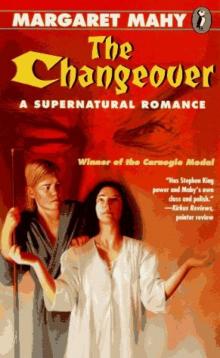 The Changeover
The Changeover